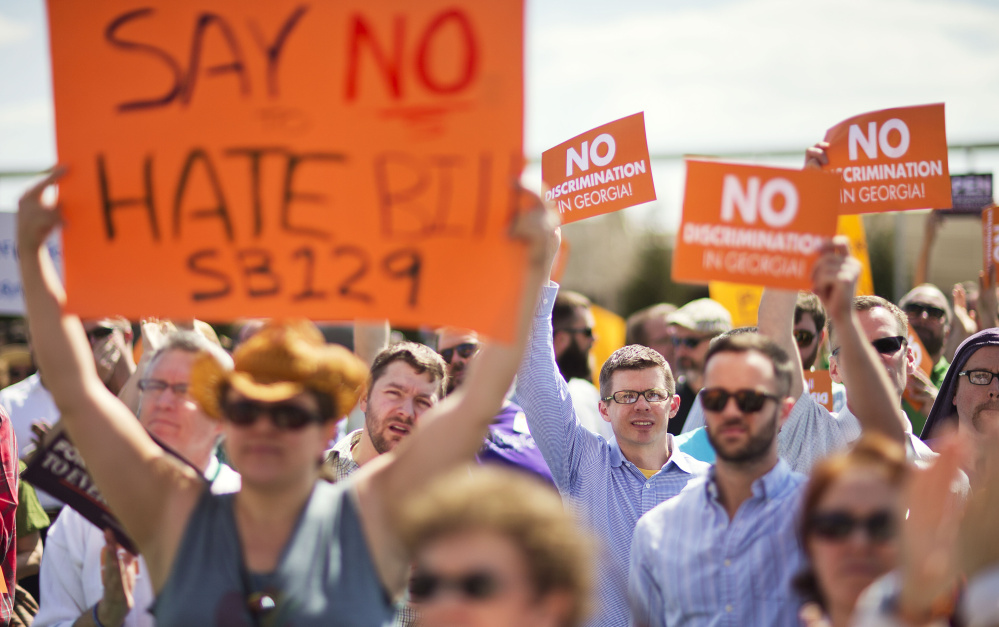ATLANTA — A public campaign by some of the biggest companies in the world launched Wednesday in Georgia, aimed at assuring gay employees and customers ahead of one of the latest legislative battles over religious freedom and gay rights.
Google, banking giant SunTrust and AT&T joined stalwarts including Delta Air Lines, Home Depot and UPS among nearly 100 businesses and universities that have signed on to the effort so far, which they have jointly dubbed “Georgia Prospers.”
It marks the first organized effort by business and education leaders against a “religious liberty” push at the state Capitol that many in the gay community fear could allow discrimination – and that the corporate world fears would make an economic pariah of the Peach State. Religious liberty supporters, however, cast it as a new line of defense to protect people of any religion from interference.
Regardless, both sides are gearing up for battle when the state Legislature starts back to work Monday with at least three bills that fall under the religious liberty umbrella, including one aiming to protect public employees who object to same-sex marriage.
SOUTHERN HOSPITALITY?
“Part of what makes our business climate so appealing is Southern hospitality,” said Dave Stockert, the CEO of Post Properties, describing the new effort. He said the campaign was intended to make “the world … know this is a welcoming state.”
The most notable legislation at the center of the religious liberty fight is Senate Bill 129, sponsored by state Sen. Josh McKoon, R-Columbus. Introduced last year after a previous effort failed, the bill has been dubbed the Religious Freedom Restoration Act and asserts that government has to show a compelling interest for why its policy should override an individual’s religious freedom. It uses much of the same language as federal legislation that Congress passed in 1993 and has since been adopted in more than 20 states.
McKoon has said repeatedly that he has no anti-gay agenda with the bill, and he often uses an example of a Sikh student who would be protected from being forced to remove his turban during ROTC training to illustrate his intention. Recently, he has challenged opponents to show a case where such legislation, commonly referred to as RFRA, was successfully used to discriminate against someone. If they do, he has offered to contribute $100 to a charity of a person’s choice. “I don’t think people who are supporting the RFRA bill are against gay Georgians,” McKoon said.
STUDIES: MONEY DOWN THE DRAIN
The fight over the bill comes on the heels of similar battles in Arkansas, Indiana and elsewhere. Georgia business leaders have consulted with their Indiana counterparts about the impact of a hotly contested RFRA bill signed into law there last year. Based on those conversations, two opponents of the RFRA effort – the Metro Atlanta Chamber and the Atlanta Co – have separately produced studies that show Atlanta and the state could see a negative economic impact of $1 billion to $2 billion if SB 129 passes without any specific civil rights protections or anti-discriminatory language that McKoon has so far opposed.
At a panel Wednesday, McKoon repeated his intentions. But Jeff Graham, executive director of Georgia Equality, called the effort a backlash against the gay community. He also said passage could open the door on other issues: public funding for students home-schooled for religious reasons; child custody battles; and businesses that may withhold health services due to religious views.
Georgia Prospers asks companies to sign a pledge saying they will welcome “all people, no matter one’s race, sex, color, national origin, ethnicity, religion, age, disability, sexual orientation or gender identity,” according to a copy obtained by The Atlanta Journal-Constitution.
Send questions/comments to the editors.



Success. Please wait for the page to reload. If the page does not reload within 5 seconds, please refresh the page.
Enter your email and password to access comments.
Hi, to comment on stories you must . This profile is in addition to your subscription and website login.
Already have a commenting profile? .
Invalid username/password.
Please check your email to confirm and complete your registration.
Only subscribers are eligible to post comments. Please subscribe or login first for digital access. Here’s why.
Use the form below to reset your password. When you've submitted your account email, we will send an email with a reset code.